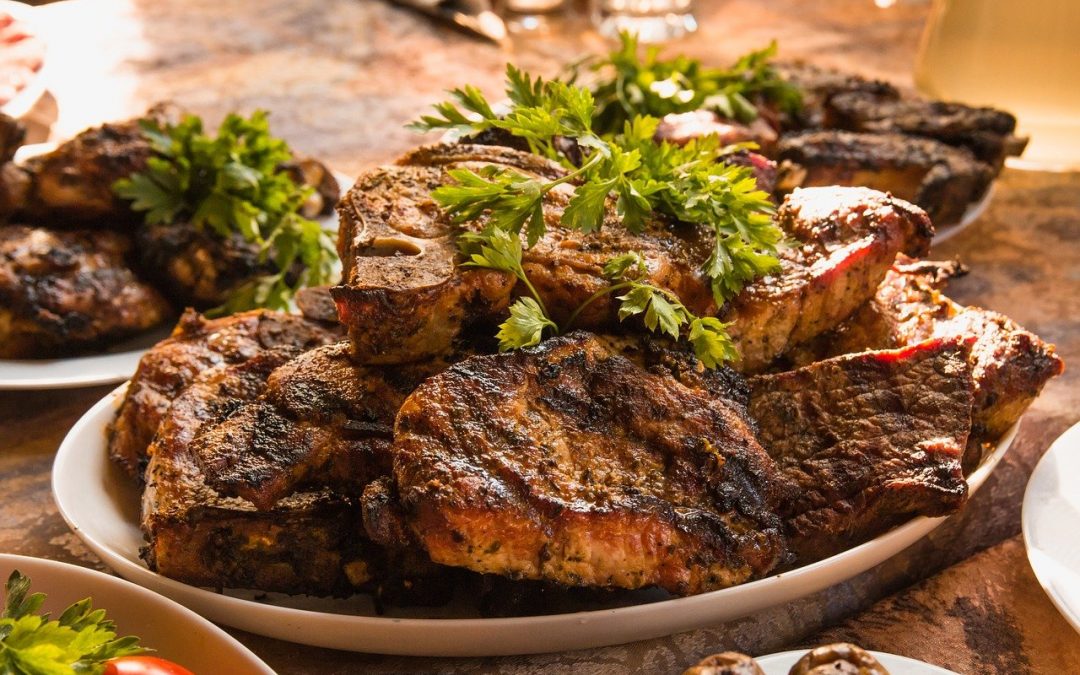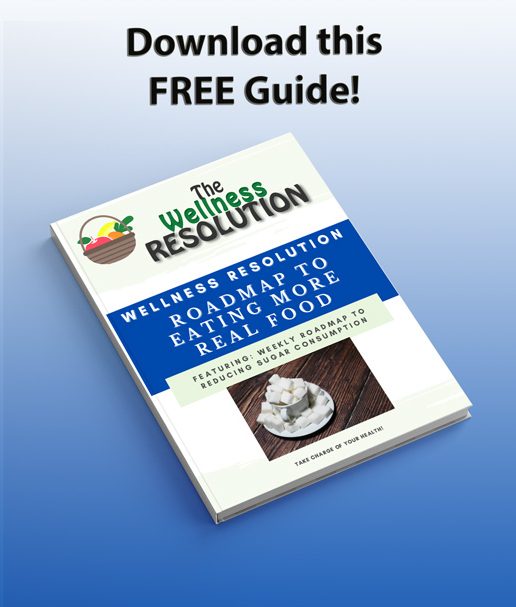How do we make sure we are eating high-quality meats? Should we buy grass-fed beef vs. grain-fed beef? Eat organic, free-range, or pasture-raised chicken? Go all organic?
Are these just luxury food items for the people with big pocketbooks? Or is it relevant to everyone? I believe we should always eat the most natural form of meat, and it is not as simple as choosing organic vs. non-organic. So, I will provide some details as to how we can find the best meat.
Grass-Fed Beef vs. Grain-Fed Beef
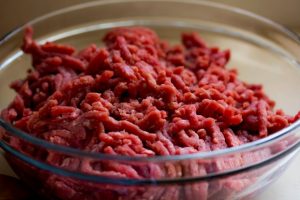 First, it is important to note that the grains cows are fed are often corn and soy – which are two of the top five allergens people struggle with today. The other three being gluten, dairy, and eggs (in case you were curious). And if the meat isn’t organic, cows are not being fed organic corn or organic soy, which means they are Genetically Modified (GMOs). You can read all about the dangers of GMOs in my blog: What are GMOs? and Are GMOs Safe? Spoiler alert: they are not that safe. You will also learn that we consume way too much corn and soy. Moreover, GMOs are likely one of the biggest reasons for food sensitivities. Additionally, corn provides no nutritional value, and soy can mimic estrogen.
First, it is important to note that the grains cows are fed are often corn and soy – which are two of the top five allergens people struggle with today. The other three being gluten, dairy, and eggs (in case you were curious). And if the meat isn’t organic, cows are not being fed organic corn or organic soy, which means they are Genetically Modified (GMOs). You can read all about the dangers of GMOs in my blog: What are GMOs? and Are GMOs Safe? Spoiler alert: they are not that safe. You will also learn that we consume way too much corn and soy. Moreover, GMOs are likely one of the biggest reasons for food sensitivities. Additionally, corn provides no nutritional value, and soy can mimic estrogen.
Grass-Fed Cows is Not Weird – It is Normal
Cows were designed to eat grass, therefore they get sick eating grains and end up needing antibiotics. But that’s not all, they often are given animal by-products and hormones. Not only do these things impact our health, but they also hurt the environment. Does it make sense for all this corn to be produced for cows to eat when there is grass readily available? This waste pollutes the air and water, and the antibiotics pollute the water supply and ground too. The whole concept is unnatural, and not the way things have always been. Grass feeding cows save energy, fertilize the land, help with invasive weeds, and they live a happier and healthier life, as well.
Grass-Fed Beef – What People Ate for Thousands of Years!
Grass-Fed beef is far from being some new luxury option, it was what people ate for thousands of years. It wasn’t until about 70 years ago that people started feeding cows grains. This wasn’t because it was a healthier option for us – nope, it was all about the profits.
Meat Thermometer Extra Large Dial 2.8-Inch
We have this simple meat thermometer, and I love it because it tells you what temperature the meat should be at based on the type of meat. Plus, the extra-large dial and text make it easy to read from the oven.
The Anti-biotic Problem
Even the World Health Organization sees this as a threat to our health as you can read in this study. In the article, they mention how eating meat with antibiotics causes people to become anti-biotic resistant making it harder to treat certain diseases.
In 2017, 70% of antibiotics sold were used for livestock. Efforts actually have been made by the FDA in 2017 to cut back on the use of antibiotics by removing “growth promotion” from pharmaceutical labels, and requiring veterinary approvals for antibiotics use in disease prevention. But, the use of antibiotics for disease prevention is still a huge issue.
How do you know if Meat is Grass-Fed?
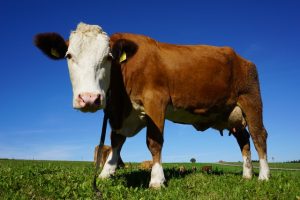 How do you know if beef is actually 100% grass-fed? Unfortunately, a lot of labels are misleading and may say “natural,” “vegetarian-fed,” and “pasture-raised.” You actually need to look for certifications on the packaging in order to find true grass-fed meat. These certifications include American Grassfed Association certification and A Greener World.
How do you know if beef is actually 100% grass-fed? Unfortunately, a lot of labels are misleading and may say “natural,” “vegetarian-fed,” and “pasture-raised.” You actually need to look for certifications on the packaging in order to find true grass-fed meat. These certifications include American Grassfed Association certification and A Greener World.
Even the organic label does not promise 100% grass-fed beef, however, it will still be a better option than regular beef. Many brands that are organic often have cows eating grass mostly. Then they are grain-finished – meaning they are fattened up on grains at the end of their life to put on enough weight.
The organic seal promises the cows ate organic foods (which could be organic soy, organic corn, etc.) and had some pasture time. Although, some meat is in fact organic and 100% grass-fed.
You could also ask your grocery store where they source their meat from or you could also go to a butcher for your beef.
Natierra Himalania Himalayan Fine Pink Salt Shaker
This salt is actually really good for you, if not over consumed. Pink Himalayan salt has more beneficial minerals and cleaner ingredients than both table salt and sea salt.
Similar Ruling for Chicken, Other Poultry & Pork!
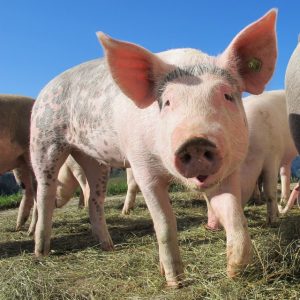
For quality pork, look for labels that say pasture or foraged pork.
These animals are supposed to eat plants as natural omnivores. A vegetarian diet of grain, corn, and soy are unnatural for them.
For pork, you want to find pasture or foraged pork where they spend time outside eating grass, weeds, and other foods. Just choosing organic pork will also be a better choice.
As I mentioned in my blog, Organic vs. Natural, food labeled as “natural” is just a marketing scheme and does not guarantee anything. The label “humanely raised” also doesn’t guarantee anything, it is a matter of opinion.
Choosing Chicken and Eggs
Most chickens are often packed into a space of 20,000 sq. ft for 30,000 chickens without any outside time or natural light. Due to the dirty spaces with possible feces from other birds, many get diseases and therefore end up consuming a lot of antibiotics. Sometimes just in their daily feed.
Cage-free, free-range, or pasture-raised will lead to better chickens, but which is better?
- Cage-free chickens don’t have outdoor access but they are not squished into a foodshed with no space to roam.
- Free-range can mean they have access to the outdoors but doesn’t guarantee they are outside often or at all. Studies show free-range chickens are healthier for you and produce healthier eggs.
- Pasture-raised spend most of their time outside. So they are eating more of what they were made to eat which is worms, bugs, and other crawly creatures found in nature.
 Worst to Best Chicken
Worst to Best Chicken
The best guarantee for quality chicken and eggs is finding a farm with pasture-raised chickens eating mostly bugs and worms, and looking for one of these three certifications: Animal Welfare Approved, Global Animal Partnership, or Certified Humane. These certifications are used for other poultry and livestock, as well.
In order of what is the healthiest from worst to best for eggs: regular eggs, cage-free, free-range, 1 of the 3 certifications (also labeled as pasture-raised), and if it is organic too you got golden eggs!
All chicken not used for eggs are technically cage-free though, and hormone-free. So those are just marketing tactics at that point. The FDA and USDA actually made it illegal in 1952 to give poultry and pigs hormones.
Choosing healthier chickens and eggs also means better health for you. It means higher omega 3-fatty acids, more vitamins, and most people say a better taste. Plus, less chance of inflammation.
6 Capacity Electric Cooker for Hard Boiled, Poached, Scrambled Eggs, or Omelets
This makes eggs quickly with less work. It makes a perfect hard-boiled egg, and you can have it cooking in the morning while you’re getting ready for the day.
What About Organic?
Organic can be a healthier choice, but it doesn’t guarantee animals are eating their natural diets. It only guarantees the foods they are eating are non-GMO, antibiotic-free, and given outside access. It is more relevant to look for that “pasture-raised” labels and certifications.
Everything you want to know about the importance of organic farming is covered in this book: Organic Manifesto: How Organic Farming Can Heal Our Planet, Feed the World, and Keep Us Safe. You get a full picture of all the reasons why organic matters, how our current farming practices have destroyed our health, corruption, and how we can make healthy changes moving forward.
Processed Meats
Processed meats include ham, sausages, any deli meat, hot dogs, and pepperoni. It is any method that preserves the flavor or shelf life of meat including salting, fermentation, curing, and smoking.
 Processed meats, like deli meats, should be limited or avoided. Research shows nitrates used in deli meats increase the chances of cancer in the body such as breast cancer or colorectal cancer. But, nitrates are almost impossible to avoid.
Processed meats, like deli meats, should be limited or avoided. Research shows nitrates used in deli meats increase the chances of cancer in the body such as breast cancer or colorectal cancer. But, nitrates are almost impossible to avoid.
In the 1990s, companies started using nitrates from natural sources. Then, the USDA had them labeled as no nitrates or uncured. But, they do in fact contain nitrates that are chemically the same as the synthetic types. So they are still not great. Alone nitrates are not bad, but when combined with proteins they become carcinogenic.
Even without nitrates, ingredients and preservatives such as BHA and BHT could be cancer-causing too. Plus, there is the chance of contamination of a deadly type of bacteria called monocytogenes. It’s not just cancer though, heart disease, strokes, and type 2 diabetes are also potential risks. In addition, unnatural coloring is often added to these meats. View Consumer Reports for further info.
The evidence is concerning enough that the World Health Organization considers processed meats (like deli meats) as a Group 1 carcinogen, in the same category as cigarettes and asbestos (Miller, 2019). However, your risk of colorectal cancer is 18% for 2 ounces a day, so if you eat it infrequently your risks are not too high.
The American Institute of Cancer Research also recommends avoiding processed meats.
Lodge Cast Iron Skillet with Red Mini Silicone Hot Handle Holder, 8-inch
Cast-iron skillets give you a better sear on your meat, which gives it more flavor! We have this size plus a 6-inch and 10-inch, and use them all frequently.
This is Part of Our Health Crisis!
These and other unnatural changes to our diet are a contributing factor to the increase we see in chronic health conditions. As I mentioned in my real food blog, there is a trickle-down effect where each generation is born with more toxins. Each generation is burdened with more toxins in their lifetime than ever before. Also, livestock has not always been given all these antibiotics that just happened in the last 80 years. That is only about one person’s lifetime. Where for thousands of years these animals have been eating the foods God intended for them to eat.
How Can We Afford This? What About Dinner Out?
I’m still learning too. I knew about most of this, but I didn’t know for example about the certifications to look for with chicken. If we look at the bigger picture of all the toxic foods we consume and we can just decide okay I’m going to make an effort to change 1 or 2 things for now… I will make an effort to buy more organic chicken, organic eggs, and avoid beef or choose grass-fed, then that is a great step in the right direction. These are not cheap changes to make. But, if we are looking at the big picture of how this is affecting our overall health just choosing a few more organic options here and there will be great long-term.
If enough people stop buying the cheaper meat options from unhealthy farming practices, then the possibilities of change for better quality and lower prices increases.
 Eating Out
Eating Out
I have been a bit more choosy about where I will go to eat and what I will order. However, I can tell you that I don’t eat at just restaurants that serve 100% grass-fed beef and pasture-raised chicken (a rather difficult task). I try not to worry too much when I go out to eat because I want to enjoy food and enjoy the experience. But, I cook the majority of my meals at home, as well.
So if you are someone who just won’t eat meat when you go out to eat, or choose to be vegetarian that’s great if that works for you. I personally find if I were to be a vegetarian or vegan, I would then end up eating more grains. Which is not the healthiest solution either. Additionally, vegetarians or vegans typically need to take extra supplementation for the vitamins and nutrients they are not getting from their food. It is also super important to have enough protein in your diet. Find out more about healthy protein with my blog on consuming fish that is wild-caught vs. farm-raised.
Instant Pot Duo 7-in-1 Electric Pressure Cooker, Sterilizer, Slow Cooker, Rice Cooker, Steamer, Saute, Yogurt Maker, and Warmer, 6 Quart, 14 One-Touch Programs My husband and I just got this one recently and love how quick and easy it is to cook meat, rice, quinoa, vegetables, and more. We have made some delicious recipes sometimes ready in under 30 minutes.
Download this Free Guide:
Roadmap to Eating More Real Food & Reducing Sugar Consumption
View More Healthy Eating Blogs
- 8 Tips on How to Eat Less Packaged Food (Less Junk Food)
- Over 30+ Gluten and Dairy Free Breakfast Ideas (& Sugar-Free)
- Reading and Decoding Food Labels & Toxic Ingredients
- 11 Superfoods for a Diet Higher in Nutrients
- 30 Clean Snacks and Desserts (Gluten-Free, Sugar-Free & Dairy-Free Options)
- How to Choose Healthier Dairy Products & Alternatives to Dairy
- The Truth About Milk – Why We Don’t Need it to Stay Healthy
- Guidelines & Steps to Reduce Sugar Intake
- Wild Caught vs Farm Raised Fish – What is the Difference? Which is Healthier?
- How to Eat Real Foods & Why It Is Essential for Your Health
- What Does Non-GMO Mean? Are GMOs Safe?
- When is Organic Really Worth it?
- Organic vs. Natural: What is the difference?
- Is White Flour Bad For You? Should We Be Eating Less Carbs?
- How the Sugar Industry Tricked us for 50 Years
- Sugar Pains? Sugar – One of our Biggest Enemies!
Resources:
- Passarella, Elizabeth. (2009, March 12). kitchn/Grass-Fed vs. Grain-Fed Beef: What’s the Difference, and Why Does It Matter?. Retrieved from: https://www.thekitchn.com/grassfed-vs-grainfed-beef-what-79032
- Curry, Lynne. (2019, July 26). HUFFPOST/How to Avoid Buying Fake Grass-Fed Beef. Retrieved from: https://www.huffpost.com/entry/grass-fed-beef-label-fake_l_5d309f0ce4b020cd99405605
- Dr. David Friedman/Dr. Friedman’s Health Blog. Retrieved from: https://www.doctordavidfriedman.com/blog/farmed-and-dangerous
- Herring, Kelley. Healing Gourmet/6 Reasons You Should Avoid Farm-Raised Fish. Retrieved from: https://healinggourmet.com/why-you-should-avoid-farm-raised-fish/
- Hari, Vani. Food Babe/How To Choose The Healthiest Chicken For You & Your Family. Retrieved from: https://foodbabe.com/truth-chickens-raised-will-disgust-eating/
- The Humane Society of the United States/How to decipher egg carton labels. Retrieved from: https://www.humanesociety.org/resources/how-decipher-egg-carton-labels
- Calvo, Trisha. Consumer Reports/Danger at the Deli. (2019, August 29). Retrieved from: https://www.consumerreports.org/deli-meats/danger-at-the-deli-cold-cuts-increased-risk-cancer-heart-disease/
I have a Wellness Coach Certificate, I'm an entrepreneur, an innovator, writer, and artist. My expertise includes over 7 years of marketing, research, and developing content for holistic health businesses. Plus, my own personal journey of becoming chronically sick: understanding what went wrong, and finding a way to heal and live a healthier life. I have a passion for wellness with a wealth of knowledge surrounding: wellness, flaws in healthcare, root causes for chronic illnesses, and alternative treatments.

